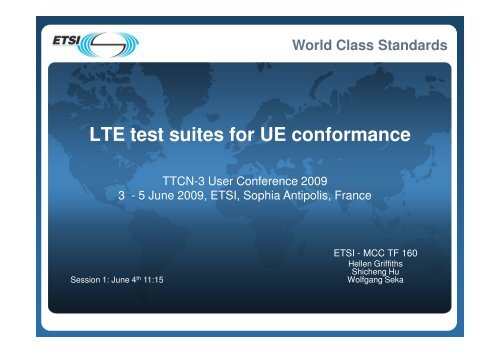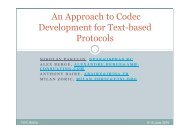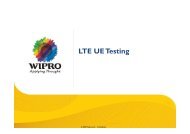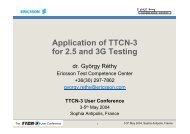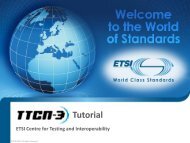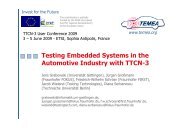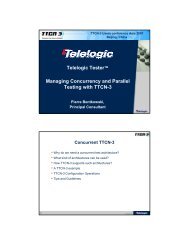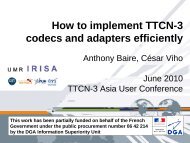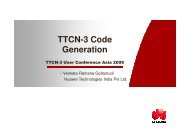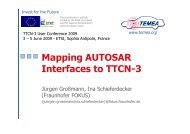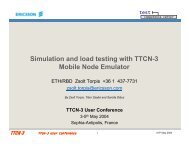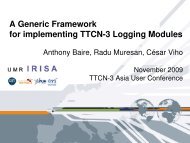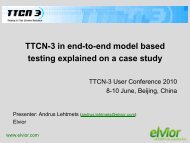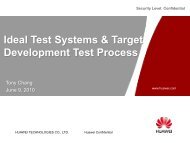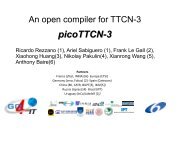LTE test suites for UE conformance - TTCN-3
LTE test suites for UE conformance - TTCN-3
LTE test suites for UE conformance - TTCN-3
- No tags were found...
Create successful ePaper yourself
Turn your PDF publications into a flip-book with our unique Google optimized e-Paper software.
World Class Standards<strong>LTE</strong> <strong>test</strong> <strong>suites</strong> <strong>for</strong> <strong>UE</strong> con<strong>for</strong>mance<strong>TTCN</strong>-3 User Conference 20093 - 5 June 2009, ETSI, Sophia Antipolis, FranceSession 1: June 4 th 11:15ETSI - MCC TF 160Hellen GriffithsShicheng HuWolfgang Seka
World Class StandardsMCC TF160 – 3GPP <strong>LTE</strong>/SAE <strong>UE</strong> Con<strong>for</strong>manceTest<strong>UE</strong> Con<strong>for</strong>mance Testing: Test Suite DesignCoding Style and Template RestrictionsConclusions
What is 3GPP?World Class StandardsA collaborative standardization activity between: ARIB (Japan-radio) ATIS (North America) CCSA (Peoples Republic of China) ETSI (Europe) TTA (Republic of Korea) TTC (Japan- core network) Founded in December 1998Prepares complete sets of specifications <strong>for</strong> mobile radio systems; GSM,GPRS, EDGE, W-CDMA, HSPA, <strong>LTE</strong> and <strong>LTE</strong>-Advanced3
World Class Standards3GPP Family EvolutionStandards availabilityEDGE EDGE+384Kb/s1Mb/sUMTS HSPA HSPA+384Kb/s18Mb/s42Mb/s<strong>LTE</strong>100Mb/s<strong>LTE</strong>-Advanced1000Mb/s200020094
MCC TF160 - GeneralWorld Class StandardsTask Force – Mobile Competence Centre: Project Group at ETSI Pool of <strong>TTCN</strong> expertise used by 3GPP3GPP: 3rd Generation Partnership Project (http://www.3gpp.org)→ Telecommunication Standardisation Bodies→ TSG RAN: Radio Access Network→ WG RAN5: Mobile terminal con<strong>for</strong>mance <strong>test</strong>ingCon<strong>for</strong>mance Tests Specification (Prose): RAN5 Implementation (<strong>TTCN</strong>): MCC TF160 Validation: Test Industry MCC TF160: Signalling Con<strong>for</strong>mance Tests <strong>for</strong> 3GPP (RAN5: Testing) Task: Develop Con<strong>for</strong>mance Test Suites <strong>for</strong> <strong>UE</strong> world-wide certification since 2000 Con<strong>for</strong>mance Tests <strong>for</strong> UMTS Signalling (<strong>TTCN</strong>-2)since 2006 Con<strong>for</strong>mance Tests <strong>for</strong> IMS (<strong>TTCN</strong>-3)2007..2008 Pre-evaluation of <strong>TTCN</strong>-3 <strong>for</strong> <strong>LTE</strong> Signalling2008..now 3GPP <strong>LTE</strong>/SAE <strong>UE</strong> Con<strong>for</strong>mance Test5
World Class StandardsMCC TF160 – <strong>LTE</strong>/SAE Project (1) Size: 18 experts all over the world Duration: more than 5 years Test cases: ~ 100 implemented; 450 planned Code size: Modules: more than 90 (more than 120 expected)> 60 000 lines of code (<strong>TTCN</strong>-3)> 250 000 words> 2 800 000 bytes Type Definitions: 15 <strong>TTCN</strong>-3 modules, 3 ASN.1 modules> 12 000 lines of code (<strong>TTCN</strong>-3)> 26 000 lines of code (ASN.1) Tools: 6 different compilers (all available at ETSI) quality checks (naming conventions, template restrictions etc.) code generation (top-level <strong>test</strong> case definitions, parameters, etc.)6
World Class StandardsMCC TF160 – <strong>LTE</strong>/SAE Project (3) Quality Requirements Tool-independent implementation Delivered <strong>TTCN</strong>-3 <strong>test</strong> cases can only be verified by 3GPP <strong>test</strong>industry⇒ Runtime Errors very costly⇒ Change Request Process Readability⇒ Code needs to be readable by 3GPP <strong>test</strong> industry, not only <strong>test</strong>case writers Impact on Implementation⇒ Tools <strong>for</strong> Quality Assurance (e.g. to avoid runtime errors)⇒ Change Request necessary <strong>for</strong> Changes in approved Objects(even on Name Changes)8
World Class StandardsMCC TF160 – Cooperation with other ETSIProjects STF343 – <strong>TTCN</strong>-3 Tool Assurance Test Suite <strong>for</strong> Tool Compatibility based on MCC TF160‘s Pre-evaluation Result STF349/380 - <strong>TTCN</strong>-3 extension and maintenance(→ Release 3.4.1 Features) Input <strong>for</strong> clarifications on TCCN-3 core spec. Handling of local timers ("any timer.timeout", "all timer.stop") Template restrictions encvalue/decvalue functions Pre-processing macros etc. Quality Assurance <strong>for</strong> <strong>TTCN</strong>-3 Test Specifications(ETSI, University of Göttingen) Usage of the Tool→ Feedback→ Additional Requirements Knowledge Exchange and Support with other ETSI Projects and Groups WiMax Test Project MTS (ETSI Body: Methods <strong>for</strong> Testing & Specification)9
World Class StandardsMCC TF160 – 3GPP <strong>LTE</strong>/SAE <strong>UE</strong> Con<strong>for</strong>manceTest<strong>UE</strong> Con<strong>for</strong>mance Testing: Test Suite DesignCoding Style and Template RestrictionsConclusions
World Class StandardsTest Suite Design: <strong>UE</strong> Con<strong>for</strong>mance Testing<strong>TTCN</strong> Executable<strong>UE</strong>Layer 3Layer 3 PDUsLayer 3ControlASPsLayer 2Layer 2DataASPsLayer 2 PDUsLayer 2ASPs: Layer-to-Layer(acc. to the <strong>test</strong> model)Control ASPs:Configuration and Controlof the Test EquipmentData ASPs:Carrying PDUs and ControlIn<strong>for</strong>mation (Timing, Routing,...)PhysicalLayerPhysicalLayerPDUs: Peer-to-Peer(acc. to the protocol standards )Test EquipmentAir Interface11
TimersWorld Class StandardsTest Suite Design: Design Considerations only local timers are used Global Variables grouped into component specific structures Accessed by wrapper functions ("set", "get") Verdict Assignment Immediate <strong>test</strong> case termination after FAIL or INCONC Test Cases Top-level <strong>test</strong> case definition generated by Tools Modular Structure Separation of components into different Radio Access Technologies(these use different type definitions) Common Modules + Test case specific modules12
World Class StandardsPTC ModelMTCMTCControl of PTCsUpper Tester (AT/MMI interface to <strong>UE</strong>)<strong>UE</strong>ControlControlASPsControlASPs<strong>LTE</strong>-PTCDataASPsL3-PDUHandlerDataASPsCoordinationASPsTest EquipmentUMTS-PTCDataASPsControlASPsPTCs: per Radio Access Technology• <strong>LTE</strong>-only• <strong>LTE</strong> + UMTS• <strong>LTE</strong> + GSM/GPRS• etc.L3-PDU Handler• coding and encryption• no verdict assignment etc.<strong>UE</strong> Control: AT/MMI Commands• Routed through MTC⇒ Only one System PortCoordination ASPs• PTC to PTC→ InterRAT Handover<strong>TTCN</strong>-3 Component Control• <strong>TTCN</strong>-3 Build-in Mechanism(Create, Start, Kill, Done, Killed, etc.)13
World Class StandardsMCC TF160 – 3GPP <strong>LTE</strong>/SAE <strong>UE</strong> Con<strong>for</strong>manceTest<strong>UE</strong> Con<strong>for</strong>mance Testing: Test Suite DesignCoding Style and Template RestrictionsConclusions
Coding StyleWorld Class StandardsProject specific Naming ConventionsETSI Generic Naming Conventions+ Project Specific Requirements⇒ 3GPP <strong>LTE</strong>/SAE <strong>UE</strong> Con<strong>for</strong>mance Test Suite Specific Naming ConventionsDifferent Approaches <strong>for</strong> Templates1. Classification into Templates with and without Matching Pattern• Templates with matching pattern shall be used in receive statements only• Templates without matching pattern may be used in receive or send statements2. Classification into Templates <strong>for</strong> Sending and <strong>for</strong> Receiving• Templates <strong>for</strong> sending are exclusively used in send statements• Templates <strong>for</strong> receiving are exclusively used in receive statements→ MCC TF160 applies 2nd ApproachProject Specific Conventions <strong>for</strong> <strong>LTE</strong>/SAE Con<strong>for</strong>mance Tests Same prefixes as <strong>for</strong> templates in <strong>TTCN</strong>-2• same people are working on/with <strong>TTCN</strong>-2 and <strong>TTCN</strong>-3 <strong>test</strong> casesTemplates distinguished <strong>for</strong> Sending and Receiving• Simple checks <strong>for</strong> template parameters (see next slides)• Improved quality check capabilities <strong>for</strong> template restrictions→ http://www.ttcn-3.org/NamingConventions.htm15
World Class StandardsNaming Conventions: Example "Baseline Moving" Old Type Definitioncr_Message := {field1 := value1,field2 := value2}⇒ the template does not contain matching pattern Extended Type Definitioncr_Message := {field1 := value1,field2 := value2,newField := * // any-or-omit <strong>for</strong> backward compatibility }⇒ now the template contains matching pattern⇒ Classification into send and receive templates does not cause problemswith baseline moving16
World Class StandardsTemplate Restrictions (Release 3.4.1)Motivation Runtime errors may be caused by matching pattern used• in send statements• as parameters of "valueof" Due to parameterisation of templates compiler cannot find all of these errorsRules Send Templates• Prefix: cs_, cas_, cds_, etc. (acc. to naming conventions)• Template itself: "template (value)"Template Parameters: "template (omit)" (optional field)"template (value)" (mandatory field)Receive Templates• Prefix: cr_, car_, cdr_, etc. (acc. to naming conventions)• Template itself (no restriction)Template parameters "template" (optional field)"template (present)" (mandatory field)Checks Rules can be checked by appropriate tool ("restrictions fitting to prefix") Correct parameterisation can be checked by compilers(parameter handed over shall follow restriction of <strong>for</strong>mal parameter)⇒ Template Restrictions + Naming Conventions = Better Quality17
World Class StandardsTemplate Restrictions: Examples Correct Implementationtemplate (value) PDU_Type cs_SendTemplate(integer p_Value,template (value) IE1_Type p_Mandatory,template (omit) IE1_Type p_Optional):= { ... } Wrong Implementationtemplate PDU_Type cs_SendTemplate(integer p_Value,template (value) IE1_Type p_Mandatory,template (omit) IE1_Type p_Optional):= { ... } // missing restriction <strong>for</strong> templatetemplate (value) PDU_Type cs_SendTemplate(integer p_Value,template (present) IE1_Type p_Mandatory,template IE1_Type p_Optional):= { ... } // missing or wrong restrictions <strong>for</strong> parameters18
World Class StandardsMCC TF160 – 3GPP <strong>LTE</strong>/SAE <strong>UE</strong> Con<strong>for</strong>manceTest<strong>UE</strong> Con<strong>for</strong>mance Testing: Test Suite DesignCoding Style and Template RestrictionsConclusions
ConclusionsWorld Class Standards 3GPP con<strong>for</strong>mance <strong>test</strong>ing moved from <strong>TTCN</strong>-2 to <strong>TTCN</strong>-3 <strong>for</strong> <strong>LTE</strong> The <strong>LTE</strong> <strong>test</strong> suite Aims to be tool independent Is visible to the whole of 3GPP Has a long project lifespan Is extendable (<strong>LTE</strong> ⇒ <strong>LTE</strong>-Advanced ⇒ ???) MCC TF160 gives feedback to and receives support from <strong>TTCN</strong>-3 Standardisation Group <strong>TTCN</strong>-3 Quality Check Projects <strong>TTCN</strong>-3 Tool Vendors MCC TF160 wants to encourage the close co-operation with the aboveparties to continue to improve the quality of <strong>TTCN</strong>-3.20
The EndWorld Class Standards


